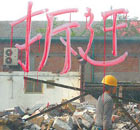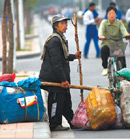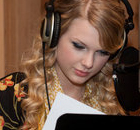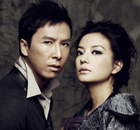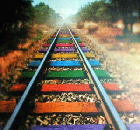Top Biz News
Stimulus policies rev up markets
By Shen Jingting (China Daily)
Updated: 2010-01-22 07:48
 |
Large Medium Small |
The booming automobile and property markets last year helped drive home Beijing's economic recovery, experts said recently, with both industries hitting record highs for sales.
The number of vehicles sold in 2009 was 1.15 million, up more than 30 percent compared to the previous year. And this rate had accelerated too, with 2008 having crept forward at only 10 percent.
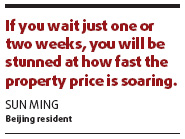
Supply finally matched demand in 2009 as output was grew by 65.8 percent from 2008, with the number of cars produced totaling 1.27 million.
"For Beijing this was a significant change because for the first time, we saw auto output surpass one million. Consumption broke the one-million-mark as well," Yu Xiuqin, deputy director of the Beijing statistical bureau, told a news conference yesterday.
"We can say Beijing has entered into an auto-consuming age," Yu said.
Meanwhile, the real estate industry sold over 23.6 million sq m of commercial houses last year, a lofty 77 percent more than in 2008.
Residential complexes inside the Sixth Ring Road are now devoid of houses priced at 10,000 yuan per sq m or less, China Business Times reported yesterday.
"If you wait just one or two weeks, you will be stunned at how fast the property price is soaring," new homeowner Sun Ming, 27, told METRO yesterday.
| ||||
"Stimulus policies, such as loosening financial rules and tax cuts on small engine cars, have revved up the car and property markets. This recovery is playing an important role in powering along Beijing's economic growth," Yu said.
Jia Yue, sales manager for an unspecified Beijing company, said his colleague had recently bought two Toyotas for daily transport and an SUV for weekend camping.
"Preferential tax was an important factor for him. The public is getting richer and they can afford those cars now," Jia said.
Beijing's GDP in 2009 reached 1.19 trillion yuan, an increase of 10.1 percent on last year. Per capita GDP reached 68,788 yuan, up by 6.2 percent. Retail sales of consumer goods reached 531 billion yuan, up by 15 percent. By the end of last year, 17.55 million people lived in Beijing, an increase of 600,000 on 2008. The migrant population was 5.09 million, 29 percent of the population.





